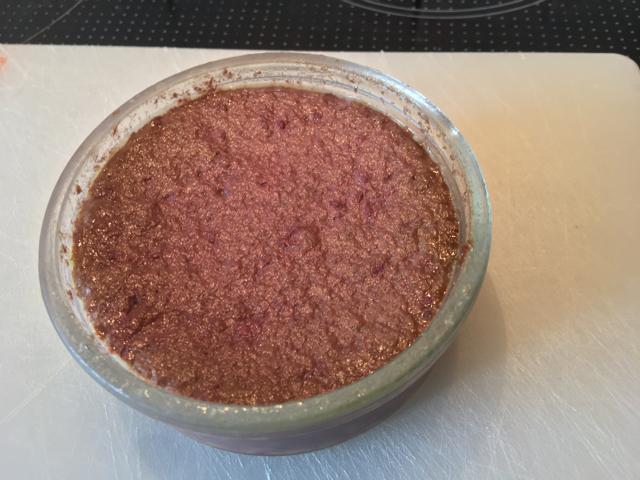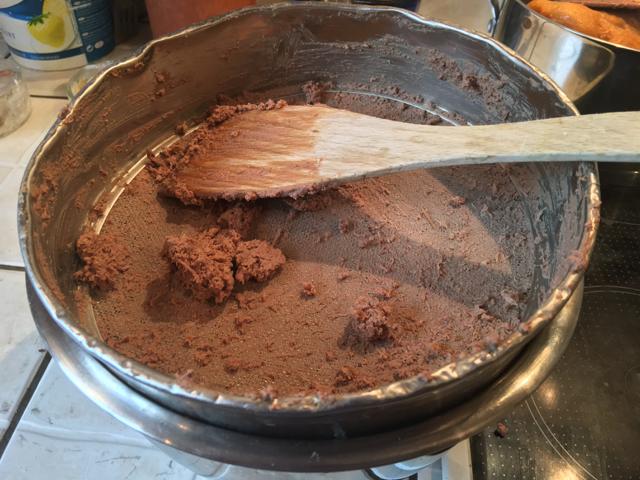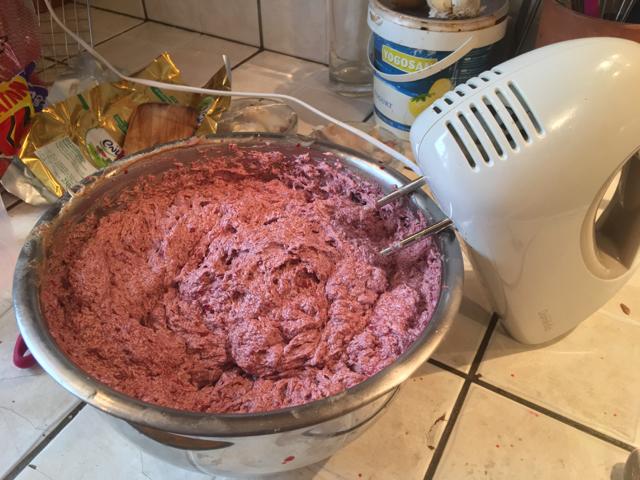-
Posts
162 -
Joined
-
Last visited
-
Hi Dan, sorry for not replying sooner. I use the NAVARRE brand flour from Lidl. It's half the price of the premium brands in other supermarkets here, and is just as good; it's 'Type 45', which has the correct amount of gluten in it for doing patisserie. I buy most of my ingredients in Lidl, in fact. They're cheaper than other supermarkets and, frankly, I love that they have one type of (good) flour, one brand of sugar and so on - I'm not confronted with 20 kinds of flour/sugar when all I want to do is bake some madeleines! Their butter is good too.
-
Parfait de mousse de foie de volaille aux framboises does sound nicer, doesn’t it? In fact, and yes I’m showing my linguistic prejudices here, all menus sound better in French than English. Crème anglaise or custard with that, madam? Vichyssoise or cold leek and potato soup? It’s an easy choice. This chicken liver and raspberry mousse is pretty easy; a little cooking, some assembly required, there you go. Start with your chicken livers; no need to do much to them, just put them into a frying pan and heat them through in a little melted butter. I did this with 600 grammes of livers. Next, the slightly difficult part: mix them up them force them through a sieve. Yes, against their will if necessary. I cook them in a saucepan so I can mix them up with a hand blender and then sieve them; if you wish, you could use a frying pan and then a blender, which I never use. Blenders are something else to go wrong, less versatile than a hand blender and much harder to clean to boot. But it’s your choice. It takes a while to do this and it it pretty messy. There are other ways to do this, but this is the easiest overall. Traditionally when cooking chicken livers you trim them by cutting out the veins and cells and crunchy bits before frying them off, and if you’re putting them in a salad then that is what you should do. However, to get the perfect parfait you do need to ensure no nasty bits are left in them, so you sieve them anyway. So cut out the first bit and do this anyway = 10 minutes of your life back, you’re welcome. I put my sieve on top of a close-fitting stainless steel bowl and force the livers through using a wooden spatula. It works well, but you could use plastic or silicone scrapers if you prefer. The object it to get all the meat through and leave behind the stringy bits. In the bowl I’ve already put two 250g packs of butter, on salted one unsalted. The mousse will start to melt the butter, making it easier to mix them up. Once you’ve finished sieving the livers, add in 500g of raspberries and 100ml of raspberry vinegar. Then you mix it all together to a smooth paste. You can do this with a wooden spoon or even your hands, and your resulting parfait will be denser; I use a hand mixer and it makes the mixture quite airy and light. Scrape around the bottom and sides of the bowl with a spoon a couple of times to ensure it mixes well, then put it into individual ramekins, large ramekins, whatever you want depending on how you want to portion this up. Then cook it in a bain marie for 30-60 minutes at 150°C – until the temperature inside gets over about 75°C. For the bain marie I use a regular oven dish into which I pour a kettle of boiling water. Bains marie ensure that whatever your cooking’s bottom doesn’t get over 100°C, so it doesn’t cook to quickly or too much and dry out. Allow the resulting parfait to cool down after cooking before refrigerating; I keep it for 3 days in the fridge or 3 months in the freezer. Spread on toasted sourdough, it’s delicious.
- 1 reply
-
- 2
-

-
My point is that cooks, by and large, prepare equally excellent food for all their customers, whether their customers care about them or not.
-
How many cooks prepare food for customers who Just Don't Care what goes on in the kitchen? All of them.
-
Every kitchen I ever worked in was always full of cooks moaning about the customers and yet still sending out beautifully prepared and presented food. What's hard to accept as a cook is that you ruin your health, your relationships and your finances for what turn out to be a bunch of hungry, ungrateful people who can't even tell the time and work out the consequences of their actions. I'm not sure what attitude I should have had in the above story: be delighted that 8 covers turn up at literally the last minute and order as if they owned the place? Sure the owner/maitre d'hotel could have explained the situation to them. But equally how much common sense does it take to go into any business 3 minutes before closing time and exploit the staff's good will for two hours? You don't have to answer that, I know the answer; my first wife was a travel agent and regularly had clients walk into the office 1 minute before closing and expect an hour's worth of advice.Same in restaurants. People are Entitled and think that service industry people should be happy to be exploited. Tip your waitress. Try the veal. I'm here all week until 10 pm, then the kitchen is closed.
-
I did, nearly 7 years ago. But through health reasons, not because of anything else. I loved cooking and still do, didn't mind the hours nor only mixing with other cooks (which wasn't what I did anyway).
-
The French also call this "legumes à la greque", no idea why. Also handy shields when fighting off dragons.
-
Oh don't get me wrong, I'm complaining about everyone. I hate 'em all!
-
Ha! He's the OWNER. He doesn't have to do anything apart from shout orders. cf: Chef 2014.
-
Cooks are, by and large, not People Persons. Waiters, sure, they like people well enough to be able to look them in the eye, smile and not laugh when you ask stupid questions. Cooks, mostly, can't do that. They want to shoulder-barge you out of the way so they can get to peeling the potatoes or gutting the fish or dressing their plate. What they want is to make you some nice food, for you to enjoy it, and then for you to go home. What they don’t want is for you to tell them how they should have written the menu. That you’d like the beef but with the sauce from the lamb. And the vegetables you think should be served with the fish. And on the side, please. Put the sauce on the side. In a pretty little pot. So I can dip my fries in it. Because now that you think about it you’d prefer fries to mashed potato. Even though there are no fries anywhere on the menu. Can you not read? Was it not clear on the menu? You won’t like the rosemary jus with the beef, and the steamed spinach isn’t suitable for the beef or the lamb. And we don't have a deep-fat frier. And then you ordered your beef rare but send it back because it’s not cooked enough. Cooks want you to arrive at the beginning of service. Come at 7, if that’s when the restaurant opens. 8 at the latest. 9 if you must, but order quickly. If it says that last orders are at 9:30 pm, don’t turn up at 9.29 and expect the kitchen to love you for your custom. Expect them to grunt and moan and whinge about your lack of consideration. And if you do turn up one minute before the end of service, don't hum and haw over your order and not be able to decide. And don't, whatever you do, order the tasting menu if you arrive so late. Of course, most people won't know about any of this wailing and gnashing of teeth that goes on in the kitchen; that's why restaurants employ waiters. But certainly in restaurants where staff work limited hours for very low wages - see my earlier article on this topic - if you stop the kitchen getting out by, say, 10pm when their wages finish, they won't be happy with you. What you won't get is the mythical spitting-in-your-food treatment; I have never, ever witnessed this in all my years cooking. And you won't get lower quality food than someone who treated the kitchen with respect - cooks live to serve good food, period. But there will be a few people more in the world who don't like you very much. The example I always quote is from Christmas, 2009. The restaurant where I was working was closing on Christmas Eve after the lunch service for three days. Chef had already left to go on his Christmas vacation, so there was just me and the dishwasher to do the lunch service. Which, as we'd told the owner repeatedly, would not be worth doing; most French people do NOT go out to eat lunch on Christmas Eve. So we hadn't stocked the kitchen with anything fresh, the 'Menu du jour' was what was left in the fridges together with anything interesting we could find in the freezers. The salad of the day was bamboo shoots from a can, mostly. We did three covers, clients leaving the hotel (which was also closing for three days) as soon as we opened at midday. Then we did nothing; we cleaned the kitchen, changed the oil in the fryer, cleaned again and stood around, the two of us moaning about how stupid it was to open on Christmas Eve. Until 1.27pm, when I saw two cars pull into the car park behind the hotel and eight - eight! - people get out and walk towards the restaurant. I called the Maitre d'hotel and warned him that we didn't have any food, certainly not enough for eight people and, anyway, it was closing time. Unfortunately the restaurant owner caught the arrivals at the door, welcomed them and seated them and gave them the à la carte menu, from which they ordered liberally. Foie gras, pigeon, bull steaks, fish. Starters, puddings, wines, everything. I listened to the order in dismay as the owner read it out and told him, flat out, that we didn't have two thirds of the dishes he'd allowed the clients to order and that, in any case, it was now 1.45 pm. But he insisted we serve them, that we defrost everything necessary and serve the group who, it turned out, were old friends of his from his previous workplace whom he'd invited over for lunch. 'Invited' in French means that you don't pay. So we ended up working one and a half hours unpaid overtime on Christmas Eve to serve a group who weren't even paying for their meal. And yes, I hated them but yes, I did cook perfect meals for them. Complaining all the time. Cooks like to complain.
- 40 replies
-
- 10
-

-

Why small restaurants may not be open all the time.
Chris Ward replied to a topic in Restaurant Life
I see an increasing tendency in the UK, especially in larger cities, for restaurants (bistro/brasserie types, not gastronomic ones) to open all day from breakfast (6-7am) through to midnight, with continuous service. They do breakfast, brunch, lunch, afternoon tea, dinner, supper, after-theatre and everything in between. They have two brigades which work, say, 6am-3pm and 3pm-midnight. Each shift gets a good part of the day off, no one works more than 8 hours a day, the restaurant makes more business and staff are, in general, happier. Seems like a good solution to me for those restaurants which have the capacity and footfall to support such an idea. -
Quick tip: To cover or not to cover a saucepan? I got into a conversation the other day about warming plates. Nowadays it's automatic and I always do it. Before I cooked professionally, it was pretty rare - special occasions only, and then only if I remembered. Something else that mystified me was: When should you put a lid on saucepans? When boiling potatoes? When making soup? When browning onions for soup? When making stew? And if so, why? Or why not? In fact, all it takes is a little common sense, like so much in cooking. If you're heating things up to cook them - boiling potatoes, making soup - then put the lid on. It reduces the cooking time and reduces the energy you need. If you're trying to colour something, or reduce it down - caramelising onions for soup, or thickening a sauce - then leave the lid off to let the steam out. If you keep the lid on then, duh, it won't reduce.
-

Why small restaurants may not be open all the time.
Chris Ward replied to a topic in Restaurant Life
Right, because nothing encourages devotion more than a bit more than minimum wage, right? -

Why small restaurants may not be open all the time.
Chris Ward replied to a topic in Restaurant Life
I opened two restaurants. One I lasted two days, the next three weeks. Both small 'family run' restaurants where the family was essentially the keen amateur cook owner with a laundry list of their favourite dishes which absolutely HAVE to be on the menu because all my friends love it when I cook it for them. The second one really pushed me over when, even though we only had a plancha/flat top grill for cooking on (because the double pizza oven was permanently full of slabs of granite for customers to have on their tables to do their own cooking on) insisted on us offering double-thick cotes de boeuf, which I think are T-bones in the US - the meat-on beef ribs which normally take 15-30 minutes to cook in an oven. And which were impossible to cook on the grill. Good grief. -

Why small restaurants may not be open all the time.
Chris Ward replied to a topic in Restaurant Life
End of service in most French restaurants is 1330 or 1400 for lunch, 2130 or 2200 for dinner. After that, and between lunch and dinner service, your only choices are fast food joints like KFC and McDo or supermarket sandwiches. In cities there are some brasseries that do continuous service 1200-2400, but not many.








